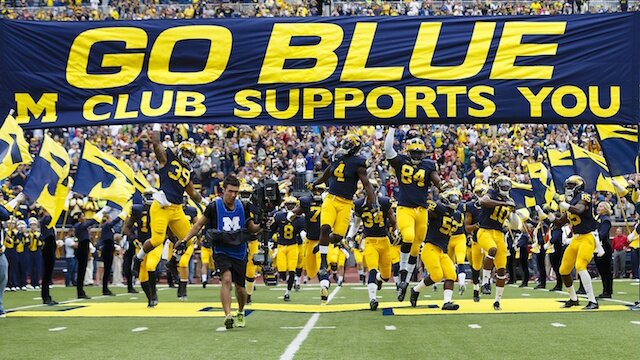
Last week, the ACC announced that the BYU Cougars would be considered a Power 5 non-conference opponent moving forward, reversing their stance from just one year ago. The move is a huge win for the independent Cougars that could pave the way for their inclusion into the College Football Playoff conversation.
When the College Football Playoff was announced, it shifted the power of college football in ways that stretched beyond just the games on the field. In essence, it centralized the power in college football to the nation’s biggest and richest conferences (ACC, Big 12, Big Ten, Pac-12, SEC), which affectionately became known as the Power 5 conferences. Together, this group of college football heavyweights consolidated power and secured the inside track to the College Football Playoff National Championship.
In response, the other FBS conferences (AAC, C-USA, MAC, MWC, and Sun Belt) banded together to form the Group of 5 and secured a guaranteed New Year’s Day bowl game for whichever conference champion out of this group finished ranked highest in the CFB rankings at season’s end. This year, the Boise State Broncos secured the bid and went on to beat the Arizona Wildcats 38-30 in the Fiesta Bowl.
But stuck between these two groups was BYU. As an Independent, the Cougars had spurned the Group of 5 conference during the flurry of conference realignment to set out on their own. They had a worldwide built-in fanbase and TV network due to their connection with the Mormon Church and secured an exclusive TV deal with ESPN. In their minds, they were hoping to set out to become the next Notre Dame Fighting Irish, an Independent program that scheduled prominent programs week in and week out across the country and existed outside the constraints of a conference.
Unfortunately for them, once the College Football Playoff came into being, conference affiliation started to become even more important. Notre Dame relented, partially, and entered a “limited” football partnership with the ACC, giving them another avenue into the CFB in addition to the usual “Notre Dame” clauses in the rulebook that carried over from the BCS era. Even the Navy Midshipmen, staples of the Independent affiliation, are caving to the pressure and are set to join the AAC in 2015.
That leaves BYU a bit out in the cold, jumping into the Independent pool just as it started to dry out. They couldn’t backtrack and re-join the Mountain West without admitting to a huge mistake and surrendering much of the control they had gained by setting out on their own in the first place. Their best hope was to continue to schedule high-profile games against Power 5 conference foes and play their way into the conversation by consistently beating top competition.
But that plan was derailed very early on. In an effort to improve the strength of schedule of their teams, many conferences, including the ACC were mandating that teams schedule at least one Power 5 non-conference opponent every season. This further limited the opportunities for small schools to cash in on payday games to help bigger programs tune up and possibly pull off huge upsets. BYU would not have had any issue with this stipulation, of course, if not for the caveat that the Cougars weren’t considered a Power 5 opponent.
Overnight, BYU found themselves with a scheduling issue. The power conference teams that they wanted to play weren’t interested in scheduling them for the most part and the Cougars weren’t interested in filling out their schedule with Group of 5 teams. Finding a suitable slate of games that would allow BYU to be successful and maintain a respectable strength of schedule became a much more daunting challenge.
Even so, the Cougars were ready to answer that challenge and prove they were a worthy opponent for Power 5 teams moving forward. During the 2014 season, BYU played three games against Power 5 teams, winning all three. They went into Austin September 6 and dominated the Texas Longhorns 41-7, giving them back-to-back wins over one of the premier college football brands in the country. September 20, they hosted the Virginia Cavaliers, winning 41-33, and then closed out the regular season in Berkeley with a 42-35 victory over the Cal Bears.
Looking ahead, BYU has worked to overcome their scheduling difficulty by lining up future games against the likes of the Nebraska Cornhuskers, UCLA Bruins, Michigan Wolverines, Michigan State Spartans, Missouri Tigers, Arizona Wildcats, Utah Utes (in the Holy War), West Virginia Mountaineers, LSU Tigers, Cal, USC Trojans, and Arizona State Sun Devils.
They’re finding teams to schedule through diligently pursuing opportunities but the fear was that these opportunities would dwindle as the Power 5 closed ranks in the future. If BYU didn’t satisfy the requirement of a Power 5 non-conference opponent and didn’t present a good “tune-up” opportunity, the thought was that bigger programs would shy away from the Cougars down the line, leaving them nothing but bottom feeders of the bigger conferences and small-conference foes to create a lackluster schedule.
If the Cougars couldn’t schedule premier competition, they would have zero shot at building a resume to be in the conversation for the College Football Playoff in the future. The decision of the ACC, while in no way puts the Cougars in the mix for a spot anytime soon, opens the door to the possibility of them making a case down the line. If the ACC relents on their stance, perhaps other conferences will follow suit. Eventually, if BYU is seen as a Power 5 opponent in non-conference play, they’ll have a case to make to enjoy the same benefits of a Power 5 conference team, like playing in the College Football Playoff.
While the BYU Cougars are not currently one of the best teams in the country, they have a proven track record of football success that should get them into the conversation. They have the facilities, the fan support, and the football team to compete on the same level as major programs in the Power 5 conferences and should be afforded the opportunity to prove it rather than being shut out in the cold.
The Cougars aren’t a Playoff team… yet. But with the opportunity that the ACC decision will give them down the line, there’s no telling what could happen. BYU deserves a seat at the table to show what they can do and may be on their way to getting one.
You can follow Tyler Brett on Twitter @ATylerBrett, on Facebook and on Google.
 Share
Share 










